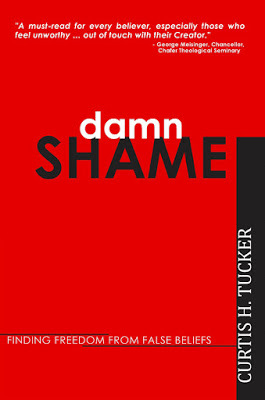Why Write?
Edie here. Today I'm very excited to have the author of the new book,
Damn Shame
, with us today. Curtis H. Tucker has the pulse on the church community (and those beyond) when it comes to our struggle with shame. He's also got a lot to share in regard to the writer's life, so I'm hoping you enjoy getting to meet him.
 Why write?Why Write?by Curtis H Tucker @MavMinister
Why write?Why Write?by Curtis H Tucker @MavMinister
Write a blog for a blog about writing. I’m sure I'm not the first person to be caught by the paradoxical nature of this idea: write about writing. This could go any number of directions. But for me: To write or not write, that is the question.
I don’t write to meet expectations or deadlines (except in this case of writing about writing). Maybe it's just me, but deadlines and expectations don’t help me. I don’t like to write when I have to write. I don’t write when I lack an inspiring idea or thought . . . sometimes those moments of inspiration are very distant from each other. I don’t write unless I have something new—this sounds naïve since, there is nothing new under the sun—or something old that could stand to be said in a new way to enhance understanding. I don’t write to get rich. I'm sure some do it for a career and actually make money, but that is not why I write.
Why I write . . .
 Primarily I write because it can help others.I write because it helps me. It's easy to think aboutthings yet harder to think through things to a conclusion. Writing helps me see my thoughts objectively and think things through to conclusions. Working my thoughts together in words that will make sense of my conclusions for other people also helps me in that process.
Primarily I write because it can help others.I write because it helps me. It's easy to think aboutthings yet harder to think through things to a conclusion. Writing helps me see my thoughts objectively and think things through to conclusions. Working my thoughts together in words that will make sense of my conclusions for other people also helps me in that process.
But primarily I write because it can help others.
What I write becomes something for others to take into their minds in the quietness of their own world without the pressure of verbal dialogue, time constraints, schedules, fears, etc. A reader can quietly consider and contemplate, read and reread as deeply and as often as they like. Words can be thoughtfully considered, prayerfully pondered, mulled over in our minds, or treasured in our hearts without any pressure from the outside world.
The reader can choose where they connect, how deeply they will engage, and how genuinely and authentically they will soak in the content and meaning. And words help because the written word has a constant and lasting nature that makes it powerful and effective. I think that's why Peter wrote; “ . . . we have the prophetic word more sure” which he was contrasting with his experience of Jesus’ transfiguration. I like it, and agree with Peter, words are more definite than personal experience. Words we read on a page originate from somewhere/someone else than our own mind or experience.
We can take those words in over and over again to interpret, ponder, and consider. The words are objective—unlike personal experiences—and are there in print. They cannot be rationalized off the page and they don’t go away. It's a conversation between author and reader that can take place anywhere and anytime. If you don’t like the words you can stop reading, skip a page, get something to eat or drink and return again, or you can throw the book away, but there is always another copy somewhere for someone to pick up and consider.
Words cannot be excused.
TWEETABLESWhy write? Thoughts on an author's drive to put words on paper - @MavMinister (Click to Tweet)
"The written word has a constant & lasting nature that makes it powerful & effective." @MavMinister (Click to Tweet)
 Damn Shameby Curtis H TuckerDoes God hate most people and only love a select few?
Damn Shameby Curtis H TuckerDoes God hate most people and only love a select few?
Is every human being born so corrupt that they awaken to this world with a sentence of eternal damnation hanging over their head? Many are gasping for air, suffocating in shame, and trapped under the weight of an erroneous belief system. Words carry the power of life and death. They produce shame – the feeling that we aren’t worthy of the air we breathe or the ground beneath our feet.
Where does shame come from? Damn Shame speaks candidly about false beliefs and unbiblical theologies, peeling back the layers of these erroneous teachings and inviting us to shift our understanding so we can begin to live as our Father really intends. If you’re tired of living a life filled with shame, this book is for you.
 Curtis H. Tucker is a So-Cal boy who grew up surfing the breaks of Newport Beach. Now, as pastor of a small, vibrant community church in Central Oregon, his lack of Christian upbringing has served him well in a pursuit of God and His truth.
Curtis H. Tucker is a So-Cal boy who grew up surfing the breaks of Newport Beach. Now, as pastor of a small, vibrant community church in Central Oregon, his lack of Christian upbringing has served him well in a pursuit of God and His truth.
Curtis has a passion to teach that truth to others so they can experience the freedom that comes from walking with God. He has two sons, Carson and Cooper. Connect with Curtis on Twitter, and through http://www.curtishtucker.com/ and http://maverick-ministers.com/
 Why write?Why Write?by Curtis H Tucker @MavMinister
Why write?Why Write?by Curtis H Tucker @MavMinister Write a blog for a blog about writing. I’m sure I'm not the first person to be caught by the paradoxical nature of this idea: write about writing. This could go any number of directions. But for me: To write or not write, that is the question.
I don’t write to meet expectations or deadlines (except in this case of writing about writing). Maybe it's just me, but deadlines and expectations don’t help me. I don’t like to write when I have to write. I don’t write when I lack an inspiring idea or thought . . . sometimes those moments of inspiration are very distant from each other. I don’t write unless I have something new—this sounds naïve since, there is nothing new under the sun—or something old that could stand to be said in a new way to enhance understanding. I don’t write to get rich. I'm sure some do it for a career and actually make money, but that is not why I write.
Why I write . . .
 Primarily I write because it can help others.I write because it helps me. It's easy to think aboutthings yet harder to think through things to a conclusion. Writing helps me see my thoughts objectively and think things through to conclusions. Working my thoughts together in words that will make sense of my conclusions for other people also helps me in that process.
Primarily I write because it can help others.I write because it helps me. It's easy to think aboutthings yet harder to think through things to a conclusion. Writing helps me see my thoughts objectively and think things through to conclusions. Working my thoughts together in words that will make sense of my conclusions for other people also helps me in that process. But primarily I write because it can help others.
What I write becomes something for others to take into their minds in the quietness of their own world without the pressure of verbal dialogue, time constraints, schedules, fears, etc. A reader can quietly consider and contemplate, read and reread as deeply and as often as they like. Words can be thoughtfully considered, prayerfully pondered, mulled over in our minds, or treasured in our hearts without any pressure from the outside world.
The reader can choose where they connect, how deeply they will engage, and how genuinely and authentically they will soak in the content and meaning. And words help because the written word has a constant and lasting nature that makes it powerful and effective. I think that's why Peter wrote; “ . . . we have the prophetic word more sure” which he was contrasting with his experience of Jesus’ transfiguration. I like it, and agree with Peter, words are more definite than personal experience. Words we read on a page originate from somewhere/someone else than our own mind or experience.
We can take those words in over and over again to interpret, ponder, and consider. The words are objective—unlike personal experiences—and are there in print. They cannot be rationalized off the page and they don’t go away. It's a conversation between author and reader that can take place anywhere and anytime. If you don’t like the words you can stop reading, skip a page, get something to eat or drink and return again, or you can throw the book away, but there is always another copy somewhere for someone to pick up and consider.
Words cannot be excused.
TWEETABLESWhy write? Thoughts on an author's drive to put words on paper - @MavMinister (Click to Tweet)
"The written word has a constant & lasting nature that makes it powerful & effective." @MavMinister (Click to Tweet)
 Damn Shameby Curtis H TuckerDoes God hate most people and only love a select few?
Damn Shameby Curtis H TuckerDoes God hate most people and only love a select few?Is every human being born so corrupt that they awaken to this world with a sentence of eternal damnation hanging over their head? Many are gasping for air, suffocating in shame, and trapped under the weight of an erroneous belief system. Words carry the power of life and death. They produce shame – the feeling that we aren’t worthy of the air we breathe or the ground beneath our feet.
Where does shame come from? Damn Shame speaks candidly about false beliefs and unbiblical theologies, peeling back the layers of these erroneous teachings and inviting us to shift our understanding so we can begin to live as our Father really intends. If you’re tired of living a life filled with shame, this book is for you.
 Curtis H. Tucker is a So-Cal boy who grew up surfing the breaks of Newport Beach. Now, as pastor of a small, vibrant community church in Central Oregon, his lack of Christian upbringing has served him well in a pursuit of God and His truth.
Curtis H. Tucker is a So-Cal boy who grew up surfing the breaks of Newport Beach. Now, as pastor of a small, vibrant community church in Central Oregon, his lack of Christian upbringing has served him well in a pursuit of God and His truth.
Curtis has a passion to teach that truth to others so they can experience the freedom that comes from walking with God. He has two sons, Carson and Cooper. Connect with Curtis on Twitter, and through http://www.curtishtucker.com/ and http://maverick-ministers.com/
Published on June 30, 2016 01:00
No comments have been added yet.



